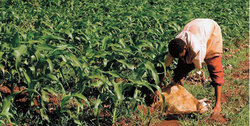
The East African | Saturday, June 30 2012
Activists raise red flag over Tanzania land deal
An independent watchdog is piling pressure on the United States government to intervene in a deal whereby by US agribusiness corporation AgriSol Energy LLC is taking over 800,000 acres of land in Tanzania’s western Rukwa region.
The US-based Iowa Citizens for Community Improvement (CCI) say they want senior government officials involved in the deal investigated and prosecuted for accepting a deal that will be detrimental to the welfare of Tanzanians.
On Saturday last week, CCI started a campaign to have the largest land deal in Tanzania’s history revoked. The watchdog group has already written to US President Barack Obama expressing their opposition to the deal.
They pointing out that the Tanzania government is leasing more than 325,000 hectares of land for 99 years without public debate or consent. They added that US tycoon Bruce Rastetter, through his energy firm AgriSol Energy, will invest over $100 million in the project.
However, Raymond Mbilinyi, acting executive director of the Tanzania Investment Center (TIC) said the deal had not yet been concluded and that TIC will not be able to offer such large chunks of land at one go.
“Currently, in conjunction with the other government organs, we are developing a policy of “land in equity” for the community to benefit from any big project by owning shares in all projects,” he said.Under the new policy of land in equity, local communities in Tanzania will be able to own shares in large commercial farming enterprises through local firms to be established in the respective districts, while farmers in the surrounding area will be able to establish outgrowers’ scheme.
However, the memorandum of understanding signed in 2010, which has been seen by The EastAfrican, shows that more than 160,000 former refugees from Burundi who were residing at a camp in the area will be displaced to pave way for the project.
Hugh Espey, executive director of CCI, maintains the deal will turn as much as 800,000 acres of land into a massive grain-and-livestock operation.
The whole operation could net AgriSol “as much as $300 million a year from the forcible eviction of subsistence farmers from refugee camps in Tanzania, leasing the newly vacant land from the government at 25 cents an acre, and exporting the vertically integrated, industrial model of corporate agribusiness from Iowa to Tanzania, all duty and tax free.”
Mr Espey said that some Tanzanian public officials accepted trips to the United States sponsored by the Iowa-based AgriSol Energy. “A 2010 blueprint and memorandum of understanding with the Tanzanian government shows AgriSol’s original intention to build large industrial farms on land occupied by more than 160,000 Burundian refugees who will be offered $200 for eviction,” he said.
According to emails seen by The EastAfrican last week, top administrators including Tanzania Prime Minister Mizengo Pinda and some government officials visited the Iowa-based firm between 2010 and2011 and were promised sponsorships for university students from Tanzania for programmes at Iowa State’s College of Agriculture and Life Sciences.
In a letter to The EastAfrican last week, the executive director of the California-based policy think tank Oakland Institute, Anuradha Mittal, says that the institute had in June last year exposed the largest land deal in Tanzania, which had been hidden away from public scrutiny and discussion.
“The project was portrayed as sustainable agriculture, all the while plans were being laid to develop large-scale monocrops, use high levels of chemicals, and even ask for changes in the national biosafety regulations so that genetically modified crops could be grown,” she said.













